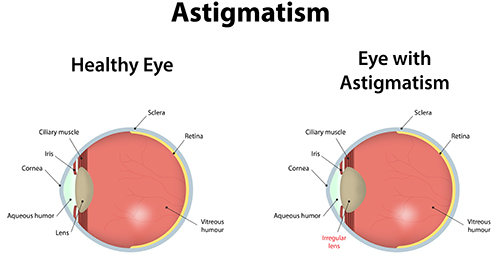2022-08-15 00:00:00Z

If you experience blurred and/or distorted images, headache, eyestrain, or difficulty with night vision, these are all common symptoms of astigmatism. It is highly advisable to talk to your eye doctor if you suffer any of these symptoms and have newfound concerns for your vision. Treating astigmatism is something that can deliver invaluable vision benefits.
The common eye problem that affects one in three people as per survey is Astigmatism. It happens as observed with nearsightedness or farsightedness. With astigmatism it will affect you in two different types. The corneal astigmatism is where the cornea is egg-shaped instead of round. And the other type of lenticular astigmatism that affects the lens and not the cornea. There are lenses that have imperfections and prevent images from reaching the retina clearly. And for the appearance it has a normal-shaped cornea or there are cases where they have both. There is a diagnostic test measure done on how your eyes focus light and what type of lenses you will need to improve your vision. Further, for an unbalanced astigmatism wherein the difference between the two eyes will cause lazy eye. As you all know, a lazy eye is an eye condition where vision in one eye is weaker than the other. Your eye specialist who will be performing a complete eye exam will diagnose the problem.
The best treatment for astigmatism of all degrees is corrective lenses. There are options for you to wear eyeglasses or contact lenses. It will depend on the degree of your case where for very slight astigmatism and no other conditions (such as nearsightedness or farsightedness), you will need glasses. And for moderate or high astigmatism, you will likely need corrective lenses.
For more tips on eye care, contact VisualEyes Optometrists.
(703) 417-9316
(703) 671-1188
(703) 764-3937
(703) 804-0355
(Pentagon ID Holders Only)
5876 Kingstowne Center Alexandria, VA 22315
Visit Website Make Appointment4018 Campbell Avenue Arlington, VA 22206
Visit Website Make Appointment9600 H. Main Street Fairfax, VA 22031
Visit Website Make Appointment1 South Rotary Road, STE 2C113
Arlington VA 22202
(For Authorized Pentagon Personnel Only)
Copyright 2025 VisualEyes Optometry. All rights reserved. Website Designed and Maintained by WSI Pro Marketing.
